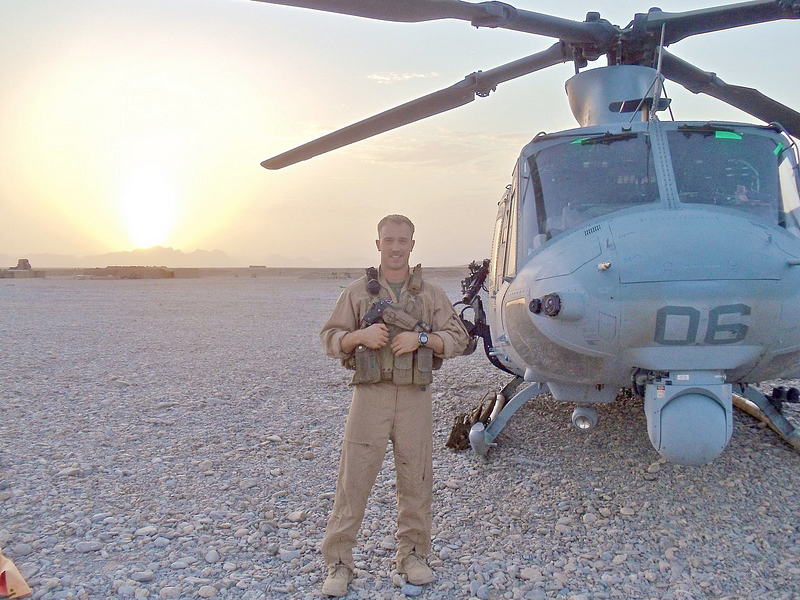
On Nov. 11 at 6:30 PM, Nick Philippi ’06 delivered the seventh annual Josiah Bunting III Veterans Day Lecture in the Taylor Science Center, Kennedy Auditorium. The lecture was sponsored by the Alexander Hamilton Institute (AHI) Undergraduate Fellows Program. Philippi served nine years as an officer in the United States Marine Corps, predominantly as a UH-1Y helicopter pilot, and now works as a financial advisor in Boston.
Philippi began the lecture by discussing the different aspects of his career to outline the points he would make in his presentation. He put extra emphasis on the “Additional Information” section of his resume. He expressed his belief that section is the most important part of a resume because it makes one seem more personable and interesting to talk to. On his resume, Philippi said he includes, “Novice surfer, persistent golfer, rusty hockey player, avid Boston sports fan, and golden retriever enthusiast.”
He then went on to discuss the importance of family in his life and the many factors that pushed him to join the Marines. He described a family lineage of service members, and said he felt that it was his calling to join the service. But he also said he knew that he was meant to go to college, so he made sure to get his degree at Hamilton first.
During the summers and between semesters on the Hill, Phillipi said he would attend boot camps like the Officer Candidate School. He added that being a member of Hamilton’s men’s hockey team prepared him for the physical tests he was put through at these camps.
After graduating from Hamilton, Philippi went on to training camp and eventually made the decision to go to flight school. After graduating from flight school, he enlisted in the Marines. Over the course of his nine years of service, he was deployed to Southeast Asia and Afghanistan. Although he was stationed in Afghanistan for many years, he said he “did not spend any time with [civilians in Afghanistan] […] our goal was to provide guidance and leadership to the Afghan troops.”
Philippi also went into detail about some of his greatest struggles during training and during service; he said one of the greatest challenges was the “debriefing” process. Debriefing meant reviewing what he did on a mission, why he did it, and what went wrong. Although he said the practice was nerve racking, he also felt it benefitted him most when he left the service and re-entered into civilian life. The self-assessment process enabled him to “think on the fly,” he said, adding, “I think when I am working, the most important part is communication. I think the Marine Corps made me be able to clearly communicate with an individual or audience and have the ability to create a process to work around and to be a good listener.”
Philippi eventually had to choose whether he wanted to remain in the Marines as a long-term career. Supported by his family and wife, he chose to instead attend MIT and earn a business degree. There he served on the Board of Veterans, who helped other veterans adjust to life after serving, with particular focus on attending college.
Phillipi described his role on the Board of Veterans as, “My most meaningful experience at MIT was helping the veterans. I was part of veterans club and I was the only Marine, so any marines that were applying got sent through me. I spent a lot of time looking through resumes, looking at essays.
“That’s what I think makes our network of veterans so special is that our folks did it for us, so we turn around and do it for the next group.”
Philippi added that he has noticed how the degree of support and welcoming for veterans returning from service has increased from prior years.
Concluding the lecture, he said, “Every service member has a different experience. Some saw combat, some wanted to see combat and didn’t, some saw combat and wanted nothing to do with it. Some went willingly into the service, others were drafted or told to go. Some lost friends, and others did not. Some proudly served over 20 years and had to be dragged out, some were counting down the days until they could get out of the service.”
His final message was to encourage students to think about service.
“This is my ask for all of you: consider service,” he said. “In any capacity, it will force you to put something else before you.”

























